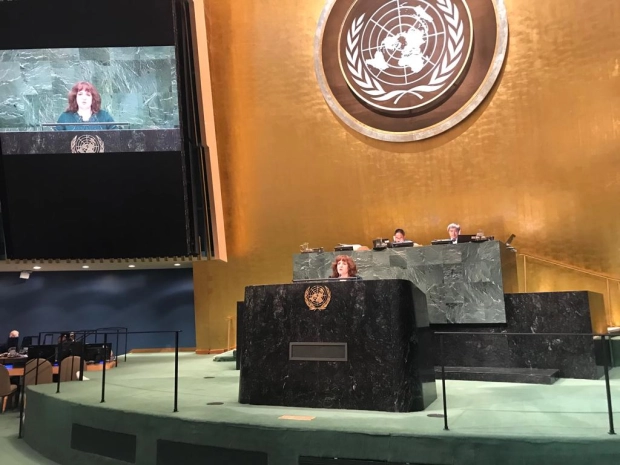
73UNGA: Report of the International Atomic Energy Agency (IAEA)
Published on 9 November 2018 at 20:25 - Modified the 25 July 2023 at 03:03
Statement by H.E. Mrs Isabelle PICCO, Ambassador, Permanent Representative:
Mister President,
Allow me to start by welcoming the re-election of Mr Yukiya Amano as head of the International Atomic Energy Agency, which demonstrates the confidence of the Member States in his leadership.
As indicated in the annual report presented to us, it is important to recall the Agency's goal of increasing "the contribution of atomic energy to peace, health and prosperity around the world" and to underline its motto "the atom for peace and development" which symbolizes in a few words the primordial character of its mission.
In a turbulent world, where our states often face several concurrent and cumulative challenges, the role of the Agency remains central.
On the one hand, it faces security challenges such as nuclear proliferation and upholds state guarantees, and its programs make an important contribution to development.
Access to safe, affordable and low greenhouse gas energy, as well as the use of nuclear techniques in the fields of agriculture, soil erosion and health in particular, contribute directly to SDGs 7, 2 and 3 respectively.
Thus, if the general public is not always aware of all the uses made of nuclear technology and the positive contribution to the daily peaceful use of the atom, the role of the Agency is main guarantor of international security and an important factor of sustainable development.
Mister President,
The Scientific Forum held at IAEA Headquarters in Vienna in September, dedicated this year to "Nuclear Technology for Climate Change: Mitigation and Adaptation", was particularly timely, as the impacts of climate change affect us, all without exception, and some countries with extreme violence.
The work of the IAEA can help us reduce greenhouse gas emissions and assess the effects of climate change through the application of nuclear techniques for scientific research and climate preservation.
Mister President,
Please be assured that the Principality will continue to support the Agency, particularly the PACT Program, which aims to improve the effectiveness of radiological medicine services in the fight against cancer, which the Princely Government has supported since 2008.
In addition, we share a deep commitment to science and cooperation with the Agency, which should help to meet the aspirations of states to contribute to sustainable development and improve the quality of life.
In the field of marine scientific research, the Agency has, for example, developed new analytical methods and conducted environmental studies to improve the understanding of the movements of toxic contaminants (mercury, lead, etc.) and their effects on coastal and marine ecosystems.
Monaco's cooperation with the Agency dates back to 1961, when the IAEA's International Marine Radioactivity Laboratory was installed in the Oceanographic Museum.
Initially, the laboratories located in Monaco were specifically dedicated to the marine environment and conducted scientific research, both in the laboratory and on the oceans and seas of the world, to assess the impacts of human activities on marine species and collect datas.
The Principality has hosted the IAEA's Environmental Laboratories for 20 years in their current location, where more than 40 people work. This anniversary was celebrated last month in the Principality with the Deputy Director General of the IAEA and Head of the Department of Nuclear Sciences and Applications.
In 2012, the IAEA also established the International Coordination Center on Ocean Acidification in the same premises at the Environmental Laboratories.
As a direct result of increased CO2 in the atmosphere, ocean acidification has significant and devastating impacts for many marine species that form a shell or have a calcareous skeleton, such as crustaceans and corals.
The IAEA, its International Coordination Center and the Monaco Scientific Center organize, at regular intervals, in the Principality, international workshops on the socio-economic impacts of ocean acidification. After reviewing the state of play, studying the implications for fisheries and aquaculture, and addressing impacts for coastal populations, the fourth edition, in October 2017, focused on the effects on coral reefs.
In conclusion, Mr President, Monaco again expresses its confidence in the International Atomic Energy Agency and is pleased to continue to co-sponsor the draft resolution.